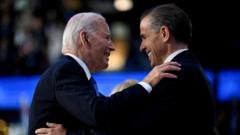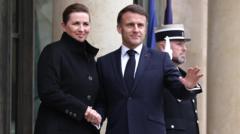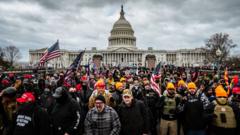President Joe Biden's unprecedented decision to grant his son Hunter a full pardon has ignited passionate responses from both sides of the political spectrum, raising questions about justice and familial loyalty.
Biden Issues 'Unconditional' Pardon for Son Hunter Amid Controversy

Biden Issues 'Unconditional' Pardon for Son Hunter Amid Controversy
In a surprising turn of events, President Biden pardons son Hunter, who previously faced serious legal charges.
In a historic move, President Joe Biden has granted an official "unconditional" pardon to his son, Hunter Biden, who was grappling with serious legal troubles, including tax fraud and possession of a firearm. The announcement, which arrives despite Biden's earlier assertions that he would not intervene in his son's cases, highlights the complexities of familial loyalty in the realm of politics.
Hunter Biden, who has been a focus of scrutiny throughout his father's presidency, pleaded guilty to various charges including federal tax fraud in September and was convicted for gun possession related to his past struggles with addiction. In light of his father's pardon, he expressed gratitude, acknowledging the challenges he faced due to his addiction and the public humiliation that accompanied his legal issues.
President Biden's decision has provoked sharp criticism from Republican leaders who question the integrity of the justice system, echoing concerns raised by former President Donald Trump about perceived double standards in the application of justice. Trump specifically referenced the treatment of those involved in the January 6 Capitol riot, implying a disparity in the legal consequences faced by different groups.
The pardon has left some Democrats uneasy as well, with Arizona Representative Greg Stanton publicly disagreeing with Biden's choice, emphasizing the need for accountability. Acknowledging the political ramifications, Biden stated that his son was "singled out" and termed the legal process a "miscarriage of justice."
This resolute endorsement of his son follows months of steadfast claims by the President that he would not use his office to shield family members from legal repercussions. Nonetheless, Biden’s latest comments reflect a deep sense of personal conflict, revealing his struggle between his duties as president and his role as a father.
As Hunter Biden begins to reshape his life after years of addiction, he commits to using his experiences to assist others facing similar battles. His sobering journey resonates as he assures that he will not take the pardon lightly, vowing to contribute positively to society.
This pardon, though controversial, is reminiscent of past presidential clemency actions, reminding observers of the blurred lines between personal and political decisions. While Biden’s life as a father has intersected with the political arena, it prompts the question of how far family loyalty can go in the face of judicial scrutiny.
As the political landscape shifts with the upcoming Presidential elections, this development is likely to remain a focal point in discussions about justice, family, and the ethics of presidential power. The ongoing reactions from both supporters and critics will play a significant role in shaping the narrative around this historic pardon.
Hunter Biden, who has been a focus of scrutiny throughout his father's presidency, pleaded guilty to various charges including federal tax fraud in September and was convicted for gun possession related to his past struggles with addiction. In light of his father's pardon, he expressed gratitude, acknowledging the challenges he faced due to his addiction and the public humiliation that accompanied his legal issues.
President Biden's decision has provoked sharp criticism from Republican leaders who question the integrity of the justice system, echoing concerns raised by former President Donald Trump about perceived double standards in the application of justice. Trump specifically referenced the treatment of those involved in the January 6 Capitol riot, implying a disparity in the legal consequences faced by different groups.
The pardon has left some Democrats uneasy as well, with Arizona Representative Greg Stanton publicly disagreeing with Biden's choice, emphasizing the need for accountability. Acknowledging the political ramifications, Biden stated that his son was "singled out" and termed the legal process a "miscarriage of justice."
This resolute endorsement of his son follows months of steadfast claims by the President that he would not use his office to shield family members from legal repercussions. Nonetheless, Biden’s latest comments reflect a deep sense of personal conflict, revealing his struggle between his duties as president and his role as a father.
As Hunter Biden begins to reshape his life after years of addiction, he commits to using his experiences to assist others facing similar battles. His sobering journey resonates as he assures that he will not take the pardon lightly, vowing to contribute positively to society.
This pardon, though controversial, is reminiscent of past presidential clemency actions, reminding observers of the blurred lines between personal and political decisions. While Biden’s life as a father has intersected with the political arena, it prompts the question of how far family loyalty can go in the face of judicial scrutiny.
As the political landscape shifts with the upcoming Presidential elections, this development is likely to remain a focal point in discussions about justice, family, and the ethics of presidential power. The ongoing reactions from both supporters and critics will play a significant role in shaping the narrative around this historic pardon.




















